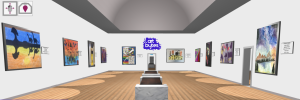dot-art
dot-art works with over 100 artists to provide an unrivalled choice of affordable, high-quality, locally sourced artwork for home or business. Operating a physical gallery and local exhibitions supported by their online website, they aim to make the art easily accessible. They frequently share blog posts via their website to ensure local artists receive recognition for their creations. dot-art is also heavily involved in sustainable practice, implementing and monitoring internal and external changes to help influence attitudes toward the planet.
CHALLENGE
Meeting with the VEC (University of Liverpool), initial discussions fell around the core understanding of how dot-art operates and the ambitions of the organisation, exploring how the unique capabilities at the VEC would be best placed for assisting dot-art.
dot-art is proud to run ‘Art Bytes,’ which inspires school children nationwide of various age groups to create and showcase their artwork, championing the creativity of the nation’s next generation whilst combining art and virtual technology.
Sponsored by the University of Liverpool’s School of the Arts, Art Bytes uploads artwork to a custom virtual gallery, enabling links to be shared with friends and family for remotely exploring and interacting with the artwork.
dot-art approached the Horizons team at the VEC to explore digital methods for making this artwork more immersive, enhancing the experience for participating children and transforming their creations into an even more realistic encounter.
SOLUTION
Collaboratively, the teams investigated the concept of integrating AR (Augmented Reality) and specialist-integrated software to support the development of their in-house digital capabilities and the development of their customer offering.
This project pioneered the use of Extended Reality (XR) and Augmented Reality (AR) web applications for streamlining the development of dot-art and their ability to showcase galleries and artwork.
Currently, dot-art uses digital photos as the VEC wanted to explore how these could be transformed into immersive digital artwork, assessing the impact of these technologies on customer engagement and satisfaction levels through anticipated improved customer experience through virtual product visualisation.
The VEC introduced dot-art to a range of 3D XR methodologies through a bespoke prototype that could become embedded into the website to illustrate the potential of this technology.
Drawing on existing key skills, the VEC proposed an evaluation of current assets and generation techniques (digital photos to 3D web assets) whilst exploring pathways for the seamless adoption of specific digital tools on the website and interactive techniques that could apply to the available artwork within the Liverpool City Region and its client base.
Using applications such as WebXR to create virtual experiences will enable the greatest reach to all school children without downloading an app and reduce the need for specific digital devices such as headsets, as it is web-based, offering greater inclusivity and accessibility.
Once implemented and showcased, the teams can closely monitor web insights and analytics to examine changes in customer engagement and satisfaction levels. Additionally, the VEC created a path for continued adoption and development of digital tools, using internal and external funding sources to help dot-art ensure long-term innovation.
IMPACT
Following all research and development phases of the project, the VEC Horizons teams facilitated a knowledge transfer workshop with dot-art to enable an in-depth understanding of the findings and technical requirements which can support future decision-making.
A report was also delivered for dot-art, highlighting all options and technologies explored, including Web AR tools and digital methodologies that will act as a pipeline for showcasing content using Augmented Reality (AR) technologies.
Hands-on workshops and a working proof-of-concept have supported the dot-art staff to gain a greater in-depth understanding of the technology selected, offering greater confidence in future developments.
Implementing immersive virtual art on their website will improve their competitive edge and enhance their unique service offering, which can appeal to customers, potential funders, artists and collaborators.
Increasing the interactivity of the artwork displayed can amplify viewer engagement levels and even has the potential to boost sales. There is predicted to be great value for the children and young people engaging with Art Bytes, in terms of creativity, confidence and newfound digital skills.
dot-art plans to introduce the immersive artwork initiative to more than 200 schools next year, becoming a significant part of the company’s business model and generating considerable momentum.
“Thanks to the partnership with the VEC’s Horizons teams, Art Bytes will be able to inspire and engage more children and young people across England with its innovative approach to creative education. This initiative not only fosters creative interests from an early age but also plays a crucial role in nurturing talent within the creative economy of the Liverpool City Region and wider country, overcoming boundaries, building confidence and celebrating creativity from an early stage.”
Lucy Byrne – Director of dot-art and Founder of Art Bytes
Click here for the downloadable case study.
